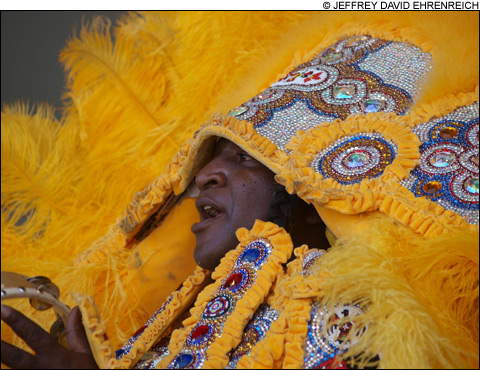
CROSS-RHYTHMS The Golden Star Hunters were mesmerizing. |
The morning after I get back from the 41st annual New Orleans Jazz & Heritage Festival, an oil executive is on the radio: “We’re throwing everything we have at it.” Meaning the exploded BP-leased well in the Gulf of Mexico, 50 miles off the coast of Louisiana. Eleven workers missing, presumed dead, and 5000 barrels of leaking crude per day. Already the dissembling has begun. Who put the oil well there in the first place? Hey, it’s another “tale of God’s will,” to quote Terence Blanchard and Spike Lee. I know: offshore drilling is clean and safe. Except when it isn’t.
Sorry, the little oil-well incident has set me off in what’s supposed to be a music piece. Because, as John Goodman’s character so eloquently puts it in HBO’s Treme: NOLA was sunk not by a hurricane, but by “a man-made catastrophe — a federal fuck-up of epic proportions.”
Treme was felt all around town this year at Jazz Fest. Billboards advertised the show. Treme creator David Simon and star Wendell Pierce took part in an interview session at the fest’s Music Heritage Stage. And adoptive New Orleanian Harry Shearer referred to the show indirectly at “Instruments a Comin’ ” — a benefit for school bands at Tipitina’s — when he talked about the attention now being lavished on the city’s irreplaceable culture.
That cultural eco-system proved nearly as fragile as Louisiana’s wetlands in the wake of Katrina. It’s hard to maintain the generational continuity of neighborhoods that have moved en masse to Houston, Memphis, and parts unknown. But somehow that cross-generational spirit is surviving, and in the first of Jazz Fest’s two weekends (April 23-25) at the Fair Grounds Race Course, it actually seemed to be thriving. The Comanche Hunters Mardi Gras Indians are from the devastated Ninth Ward, but in their show on Friday, as opposed to past years, there was no mention of “coming back.” They’re just back, period.
That cultural continuity was represented in a multitude of acts: from jazz musician Donald Harrison Jr., who learned how to be a Mardi Gras Indian chief from his father, to the generations of Savoys playing as part of the Cajun-music Savoy Music Center jam to — of all people — trumpeter Jimmy LaRocca, of the Original Dixieland Jazz Band, descendant of his father Nick’s ODJB, who made the very first jazz recordings in 1917.